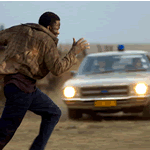Catch a Fire (Phillip Noyce)
Patrick Chamusso (Derek Luke) is the hero we never knew about. A father, a husband, working as a foreman at the Secunda oil refinery in South Africa during early ‘80s, his only concerns were providing a good living for his family and coaching the soccer team in his neighborhood. He didn’t live a fancy life by any means, but he got paid enough to live comfortably, which is more than others like him could say. He stays out of trouble and away from the growing political tension that existed in the land run by the government’s apartheid system.
After attending a wedding, he and his family are returning home when their car is stopped at a checkpoint. African National Congress (ANC) rebels had sent a bomb on a train track nearby and the security policemen pulled him from his car and pushed him to the ground, suspicious of his ability to afford a car and the camera they find in his trunk. This is a prelude of what is to come.
Director Phillip Noyce opens the story in “Catch A Fire” even more, showing Chamusso with his wife, mother and two daughters, doing things that South African families do. And with a change of scenery, we see Nic Vos, played by Tim Robbins, a Colonel in the South Africa’s Police Security Branch who is responsible for tracking down the rebels, or as they see them, terrorists who threaten the white way of life. Vos is with his family, sitting in a park eating lunch while he plays them his guitar, then taking his family out for target practice, which is upsetting to his oldest daughter.
The two men’s lives intertwine when the refinery is bombed, and because Chamusso is a supervisor with access, he comes under suspicion. Although Chamusso was innocent, his alibi was gray at best, so for months they held him, torturing him to get a confession and information about ANC operations. Things he knew nothing about. Vos never needed to officially charging him with any crime or allow representation, and the torture tactics used sound glaringly familiar to what exists today with GITMO. It is disheartening to realize this while watching this film, and that more the 20 years later, these kind of tactics still exist today.
When his wife is brought in and tortured, that’s when Chamussos’ world changes. They are both ultimately released, but the damage is done. He leaves his wife and his family to become what he was accused of, a rebel fighter for the ANC that would plan and perform another bombing of the refinery.
What Noyce created here is an amazing piece of work and emotional journey that intensifies with every scene, all while learning a lesson in a history that dates back within our lifetime. Duke’s performance left its mark, and it was evident that he took the consulting from the real Chamusso to heart, representing his unbridled determination and fiery soul. The music also plays a large part, as it does in the life of the South African’s, a cathartic tool that fuels their spirits. Bob Marley in particular was a huge influence of that time and also inspired the title of the movie.
This is one of the best movies to come out in 2006, bar none, and it will be no shock when its presence is also felt at next year’s Academy Awards.



